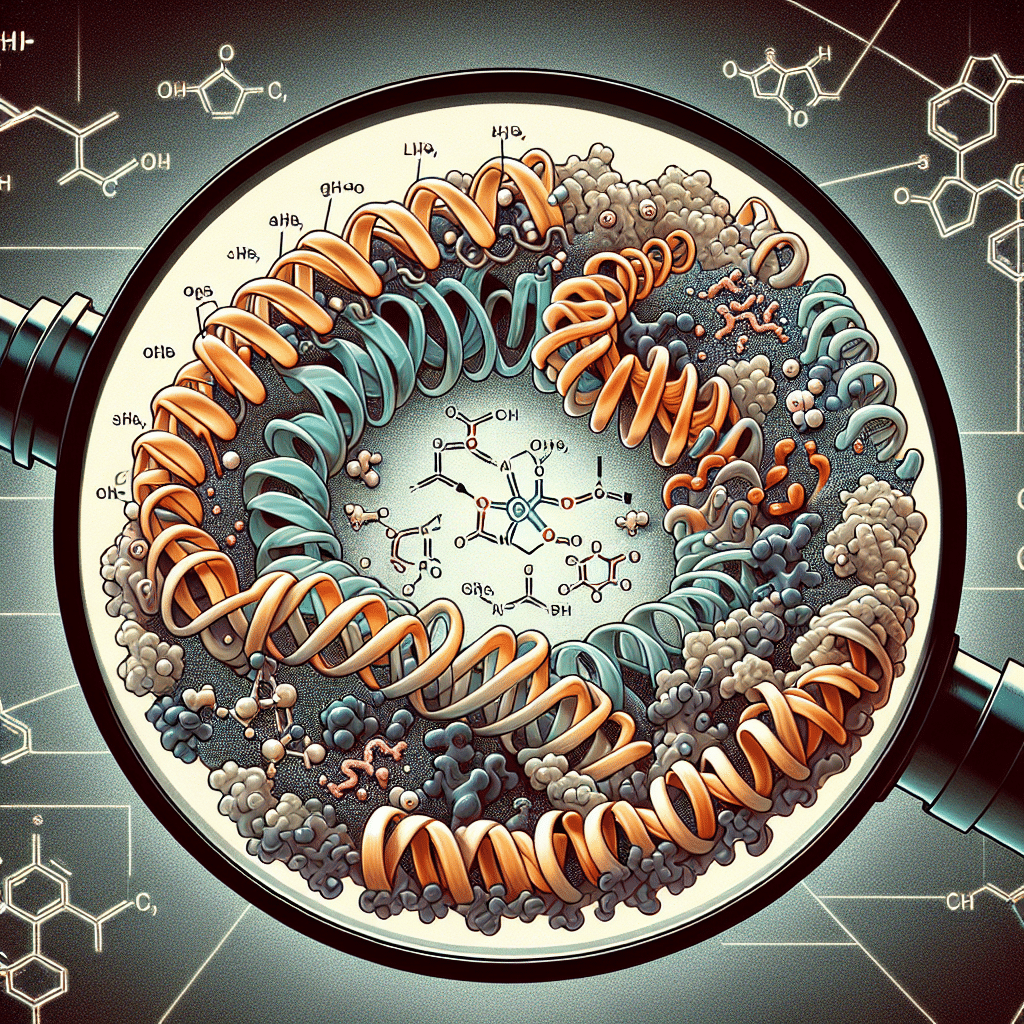Post-Translational Modifications: The Final Touches on Proteins
-
Table of Contents
- Post-Translational Modifications: Enhancing Protein Functionality
- Understanding Post-Translational Modifications
- Types of Post-Translational Modifications
- Enzymes Involved in Post-Translational Modifications
- Functional Implications of Post-Translational Modifications
- Regulation of Enzyme Activity
- Protein-Protein Interactions
- Protein Stability and Turnover
- Examples and Case Studies
- Alzheimer’s Disease and Tau Phosphorylation
- Cystic Fibrosis and CFTR Glycosylation
- Statistics and Trends in PTM Research
- Conclusion: The Critical Role of Post-Translational Modifications
- Discover High-Quality Proteins with ETprotein
Post-Translational Modifications: Enhancing Protein Functionality

Proteins are the workhorses of the cell, performing a vast array of functions essential for life. However, the journey from gene to functional protein is not complete once a protein is synthesized. Post-translational modifications (PTMs) are crucial alterations that proteins undergo after synthesis, which can dramatically alter their function, localization, stability, and interactions. This article delves into the fascinating world of PTMs, exploring their significance and the intricate roles they play in cellular processes.
Understanding Post-Translational Modifications
Post-translational modifications refer to the covalent processing events that proteins undergo after their translation from mRNA. These modifications can include the addition or removal of functional groups, proteolytic cleavage, and the formation of disulfide bridges, among others. PTMs are catalyzed by specific enzymes and can be reversible or irreversible, depending on the type of modification and the cellular context.
Types of Post-Translational Modifications
- Phosphorylation: The addition of a phosphate group, typically to serine, threonine, or tyrosine residues, which can regulate enzyme activity and signal transduction.
- Ubiquitination: The attachment of ubiquitin molecules to lysine residues, marking proteins for degradation by the proteasome or altering their cellular location and activity.
- Acetylation: The addition of an acetyl group, often to lysine residues, influencing gene expression and protein stability.
- Glycosylation: The attachment of sugar moieties to asparagine, serine, or threonine residues, affecting protein folding, stability, and cell signaling.
- Methylation: The addition of methyl groups, commonly to lysine or arginine residues, impacting gene expression and protein interactions.
- SUMOylation: The addition of Small Ubiquitin-like Modifier (SUMO) proteins, modulating protein localization, stability, and transcriptional regulation.
Enzymes Involved in Post-Translational Modifications
Enzymes such as kinases, phosphatases, acetyltransferases, methyltransferases, and glycosyltransferases are responsible for adding modifications, while others like deubiquitinating enzymes and demethylases remove them. The precise control of these enzymatic activities is critical for maintaining cellular homeostasis.
Functional Implications of Post-Translational Modifications
PTMs can have profound effects on protein function. They can alter the enzymatic activity, affect protein-protein interactions, dictate the cellular localization of proteins, and influence protein stability and turnover. These modifications are not merely final touches; they are essential for the dynamic regulation of proteins in response to cellular signals and environmental changes.
Regulation of Enzyme Activity
Phosphorylation is a prime example of how PTMs can regulate enzyme activity. The addition or removal of phosphate groups can turn enzymes on or off, serving as a switch for metabolic pathways and signal transduction cascades.
Protein-Protein Interactions
Ubiquitination and SUMOylation can create docking sites for other proteins, influencing the formation of protein complexes and signaling pathways. These modifications can also target proteins for degradation, thereby regulating protein levels and activity within the cell.
Protein Stability and Turnover
Acetylation and methylation can stabilize proteins by preventing their ubiquitination and subsequent degradation. Conversely, ubiquitination can signal for protein degradation, thus controlling the half-life of proteins in the cell.
Examples and Case Studies
Research has uncovered numerous examples where PTMs play a pivotal role in health and disease. For instance, aberrant phosphorylation is a hallmark of many cancers, as it can lead to the uncontrolled activation of oncogenes or the inactivation of tumor suppressor genes. Similarly, defects in glycosylation pathways have been linked to congenital disorders and immune deficiencies.
Alzheimer’s Disease and Tau Phosphorylation
In Alzheimer’s disease, hyperphosphorylation of the tau protein leads to the formation of neurofibrillary tangles, a key pathological feature of the disease. This example underscores the importance of tightly regulated PTMs for maintaining neuronal health.
Cystic Fibrosis and CFTR Glycosylation
The cystic fibrosis transmembrane conductance regulator (CFTR) protein, when improperly glycosylated, results in cystic fibrosis. Proper glycosylation is essential for CFTR to reach the cell surface and function correctly in chloride ion transport.
Statistics and Trends in PTM Research
The field of PTM research is rapidly expanding, with thousands of modifications identified and their roles in various diseases being elucidated. Proteomics studies have revealed that more than 200 types of PTMs may exist, highlighting the complexity of protein regulation.
Conclusion: The Critical Role of Post-Translational Modifications
In conclusion, post-translational modifications are vital for the functional diversity and regulation of proteins. They serve as essential mechanisms by which cells adapt to their environment and respond to internal and external cues. Understanding PTMs is crucial for deciphering the complexities of cellular function and for developing therapeutic strategies for a multitude of diseases where these modifications go awry.
Discover High-Quality Proteins with ETprotein
If you’re in need of premium protein products for research or industrial applications, consider ETprotein’s offerings. Their extensive range of organic bulk vegan protein and plant proteins, including rice, pea, pumpkin seed, and sunflower seed proteins, are non-GMO and allergen-free, making them suitable for a variety of industries.
ETprotein’s expertise in exporting and delivering tailor-made protein powder and nutritional supplements ensures that you receive the best solutions for your protein needs. Whether you’re involved in food and beverage, sports nutrition, weight management, dietary supplements, health and wellness products, or infant formula, ETprotein has you covered.
Trusted by leading global brands and Fortune 500 companies, ETprotein upholds China’s reputation for quality in the global market. For more information or to sample their products, reach out to them at sales(at)ETprotein.com today.
About ETprotein:
ETprotein, a reputable protein Chinese factory manufacturer and supplier, is renowned for producing, stocking, exporting, and delivering the highest quality organic bulk vegan protein and plant proteins. They include Organic rice protein, clear rice protein, pea protein, clear pea protein, pumpkin seed protein, sunflower seed protein, mung bean protein, peanut protein etc. Their offerings, characterized by a neutral taste, non-GMO, allergen-free attributes, cater to a diverse range of industries. They serve nutraceutical, pharmaceutical, cosmeceutical, veterinary, as well as food and beverage finished product distributors, traders, and manufacturers across Europe, USA, Canada, Australia, Thailand, Japan, Korea, Brazil, and Chile, among others.
ETprotein specialization includes exporting and delivering tailor-made protein powder and finished nutritional supplements. Their extensive product range covers sectors like Food and Beverage, Sports Nutrition, Weight Management, Dietary Supplements, Health and Wellness Products, and Infant Formula, ensuring comprehensive solutions to meet all your protein needs.
As a trusted company by leading global food and beverage brands and Fortune 500 companies, ETprotein reinforces China’s reputation in the global arena. For more information or to sample their products, please contact them and email sales(at)ETprotein.com today.












